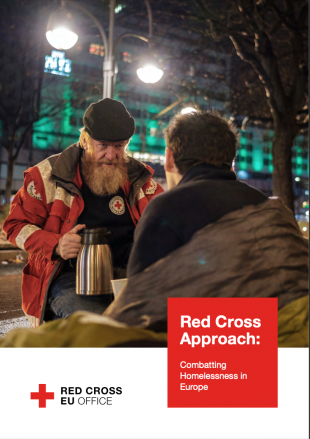Red Cross Approach: Combatting Homelessness in Europe
The COVID-19 pandemic has severely impacted the most vulnerable groups in Europe. Beyond the negative health consequences, the disruptive effects of the pandemic have significantly affected groups that were already exposed, such as families experiencing poverty, migrants and survivors of gender-based violence. Indeed, people experiencing homelessness have been identified as one of the most affected groups of the pandemic.
In collaboration with national, regional and local authorities, service providers and other organisations, European Red Cross Societies support people who are experiencing homelessness or at risk of becoming homeless. The range of activities presented in this publication showcases the scope of assistance provided to support a wide diversity of vulnerable groups through community-based services and committed volunteers. Importantly, this publication also highlights the impact of the Red Cross’ approach to preventing, responding to and lifting people out of homelessness.
Here are our key recommendations at EU level:
-
Support Member States to implement the EPSR and the Lisbon declaration by allocating funding, developing policy guidance and sharing good practices which have been shown to successfully support people experiencing homelessness. In this context, partnerships should be created with social service providers to ensure progress towards implementing the declaration at the national level.
-
Help Members States to guarantee the right to quality housing for all, as outlined in principle 19 of the EPSR, including by supporting the collection of national data and statistics on homelessness and its underlying causes, as well as the development of integrated and holistic national housing strategies.
-
Invest in the social services sector to address homelessness. Not-for-profit actors, such as National Red Cross Societies, have the trust of homeless populations through their provision of integrated, holistic and sustainable frontline assistance and services to thousands of people who are homeless or are at risk of becoming homeless.
-
The Fund for European Aid to the Most Deprived (FEAD) contributes to strengthening social cohesion by addressing humanitarian, social and health emergency needs. Including FEAD in the new European Social Fund Plus (ESF+) should continue to provide unconditional assistance to people at risk of homelessness, while safeguarding dignity and leaving no one behind.
-
To promote social inclusion and help people experiencing homelessness to regain autonomy and control over their lives, ESF+ should continue to support long-term approaches that do not exclusively focus on employment-related actions but prioritise access to sustainable and durable housing-led solutions.
-
The European Semester process should consider specific indicators to analyse the impact of existing high-quality and affordable health and care services in all EU Member States and their correlation with the size of the homeless population.


